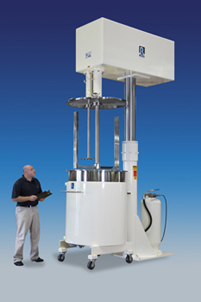The success of modern adhesive chemistry can only go so far as our capability to produce them cost-effectively. It is essential that process engineers are updated regularly on the different mixing technologies that are available. Many of these mixers uses and functions overlap such that two or more types of mixing systems can actually be successfully used for the same application. For example, many types of epoxy-based adhesives, contact cements, hot-melts and pressure-sensitive adhesives can be made in heavy-duty multi-shaft, double planetary and hybrid planetary mixers. One design may however be able to make a batch in much less time, and with less power, and at a lower cost when compared to another design.
We offer quantitative measurement as a critical step in evaluation of the mixing trials . With advanced laser diffraction particle size analyzers and other specialized instruments, Ross offers its customers excellent accuracy in assessing test results. Especially when the process requires sub-micron emulsification or dispersion, this degree of accuracy ensures that customers are buying the best possible equipment.
A visit to our test & development center will be very helpful and will make your selection process easier. You can test a variety of equipment and techniques using your own raw materials, simulating conditions as close to your actual process as possible.
Call 1-631-234-0500 or Email to schedule a test.
Mixing highly filled compounds
Advantages of double planetary mixers over sigma blade kneaders
Mixing high solids formulations
Shorten your dissolution time by switching to a multi-agitator mixer.
Hybrid planetary mixers produce high viscosity mixtures with ultra-fine dispersion quality.
High speed mixing: saw-tooth dispersers vs. rotor/stator mixers
Helical double planetary blades promote better and cleaner mixing
Double planetary mixers are ideal for low shear processing of viscous materials

